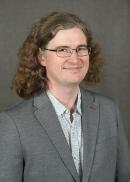UHV lecturer shares reflections on theories of death, time
Death is a subject that many people prefer not to discuss or consider, but a University of Houston-Victoria lecturer plans to share how an awareness of death and the passage of time can play an important role in how people live their lives.
William Scott Harkey, a UHV senior lecturer in English, will present a talk titled “Death and Time” from 7 to 8:30 p.m. Nov. 21 in the Alcorn Auditorium inside UHV University West, 3007 N. Ben Wilson St. The presentation will focus on the work of Ernest Becker and Terror Management Theory.
“Becker’s work offers a lens through which we can examine everything in life, from the big things like the rise and fall of leaders, to the everyday decisions we all make,” Harkey said. “His work is revolutionary because it deals in the direct reality of the human condition. Life is a thing of beauty because it is limited in time, and that limitation can motivate each of us to do great and inspiring things, or simply push us to be better people.”
Ernest Becker was an American cultural anthropologist and the author of award-winning books including “The Denial of Death,” which won the Pulitzer Prize. According to the Ernest Becker Foundation, he worked as a professor at Syracuse University, the University of California at Berkeley, San Francisco State University and Simon Fraser University in Vancouver. His research and published works examined human behavior and human nature. For example, his book “The Birth and Death of Meaning” showed how language allows humanity to move beyond the instinctive nature of animals and operate with a new level of awareness and freedom. In “The Denial of Death,” Becker asserts that civilization is essentially a defense mechanism against mortality by creating something that lives beyond the individual.
“Human beings are finite. We find ourselves as mortal beings in a world we didn’t choose,” said Justin Bell, UHV professor of philosophy. “According to Plato, Socrates claimed that the role of philosophy was to prepare for death. Indeed, finding meaning in life has preoccupied artists, writers, philosophers, scientists, psychologists and theologians. All humans have to face questions like: ‘What are we to do with ourselves?’ ‘What are we to make of our limited time on Earth?’ and, ‘What should I leave behind?’ These questions do not have easy answers, yet we each must answer them ourselves. Harkey's talk promises to give some insight into these fundamental mysteries by starting with the basic but horrifying reality of our mortality.”
One of the theories Harkey plans to discuss is Terror Management Theory, which was created by a group of scholars based on the work of Becker. According to Psychology Today, the theory examines how people’s anxiety about death drives them to adopt views about themselves and the world that protect the self-esteem and allow them to see themselves as playing an important role in society.
“I’ve been mildly obsessed with Becker and his theories about life and the human perception of death for 20 years now,” Harkey said. “I’m looking forward to sharing that interest with students and others as we talk about how our attitudes toward being impermanent beings affect our actions and our lives. I hope it will be an interesting discussion that people can take with them.”
The University of Houston-Victoria, located in the heart of the Coastal Bend region since 1973 in Victoria, Texas, offers courses leading to more than 50 academic programs in the schools of Arts & Sciences; Business Administration; and Education, Health Professions & Human Development. UHV provides face-to-face classes at its Victoria campus, as well as an instructional site in Katy, Texas, and online classes that students can take from anywhere. UHV supports the American Association of State Colleges and Universities Opportunities for All initiative to increase awareness about state colleges and universities and the important role they have in providing a high-quality and accessible education to an increasingly diverse student population, as well as contributing to regional and state economic development.


